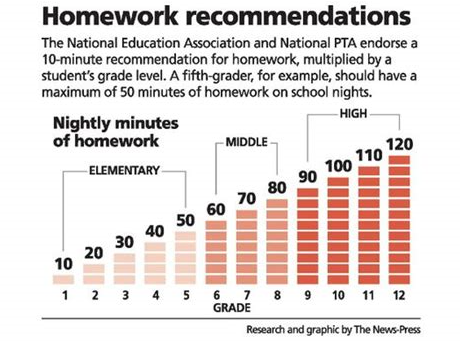Why We Have Homework All Wrong
May 11, 2020
As students, our relationship with homework is long-going, complex, and seemingly never-ending. After a long day of school, followed by sports, club activities, dance, music, or another one of the many extracurricular activities students are involved in, the last thing most want to do is homework. Yet, while master procrastinators (such as myself) can push assignments later and later into the night, there are only so many hours a day, and only so long assignments can be left uncompleted without consequences.
So, we are forced to drag ourselves back over to the desk to complete even more work, leaving limited time for healthy habits such as social interaction, hobbies, and sleep. While there are widely recognized benefits of homework, are these benefits worth the physical and mental health detriments?
First of all, it needs to be recognized that even if homework is deemed necessary and beneficial, students are currently being assigned way too much homework, and are insanely over the time limit of what is recommended for high school students to be spending on homework per night. Both the National Education Association (NEA) and the National PTA (NPTA) support a standard of “10 minutes of homework per grade level” and setting a general limit on after-school studying.” This means that theoretically high school seniors should be spending no more than two hours on homework each night.

Personally, as a freshman, I had regularly spent more than two hours on homework a night, and according to other student responses, this was a common thread. There was a reported minimum of 1-2 hours of homework a night, ranging up to junior who stated “ If I do have a Summative that is due the next day, then the time spent on my homework can range from 5-9 hours. Although, if I do not have a Summative due the next day the time I have to spend on my homework ranges from 4-5 hours.”
It is clear that the majority of the high school student body is spending too much time on homework, but this is not just a problem in high school. According to a Stanford study published in The Journal of Experimental Education, “Contrary to the 10 Minute Rule, primary school children received about three times the recommended load of homework.”
In addition to this, according to an article published in The Atlantic by Joe Pinsker, “The 21st century has so far been a homework-heavy era, with American teenagers now averaging about twice as much time spent on homework each day as their predecessors did in the 1990s.”
It’s unarguable that homework is beneficial. It has been proven time and time again to help students with skills in time management, organization, and as an anonymous sophomore stated, “without homework I would probably forget a lot of stuff that I’ve learned in classes. Homework helps me practice what I know, and if I’m not doing so great on my own, with my homework, I know to ask my teachers for help. Without homework, I also think studying would be a lot more difficult, and I wouldn’t perform as well on tests.” Freshman Sisi Li additionally stated, “ I think when given the right amount of homework, it can help you learn.”
There is also research completed in the early 2000s by Harris Cooper, a professor of psychology and neuroscience at Duke University. Cooper “found that, up to a point, the amount of homework students reported doing correlates with their performance on in-class tests.”
However, as Oxford Learning states, we ”only get these benefits if students are engaged and ready to learn. More homework also generally means less student engagement.” The article goes on to state that “Students who spend too much time on homework are not always able to meet other needs, like being physically and socially active.”, as well as have a lack of balance in their lives, chronic burnout, and decreased active learning and participation in class. “40% of high school students are chronically disengaged from school.”
These large workloads of homework have also shown to contribute to increased stress levels and decreased amounts of sleep. A survey with over 260 ISB high school students revealed that shockingly 2.3% of our student body gets enough sleep on an average school night. Furthermore, 85.6% of the student body claims that homework is a primary cause in keeping them from getting enough sleep.

According to The National Sleep Foundation, lack of sleep can lead to acne & other skin problems, contributes to illnesses and can lead to substance abuse as well as depression. Sophomore Anna Temchenko stated “I’ve found homework is detrimental to my health. On a day when I have large quantities of it, my sleep is impaired, meaning I don’t get the healthy 8 hours.”
According to the aforementioned Stanford study, “56 percent of the students considered homework a primary source of stress, according to the survey data. Forty-three percent viewed tests as a primary stressor, while 33 percent put the pressure to get good grades in that category. Less than 1 percent of the students said homework was not a stressor.”
It is also worth re-evaluating our quantity of homework in a time of virtual learning. Many students are generally receiving more homework than usual. Sophomore Ayla Cilliers stated, “the line between classwork and homework gets a little blurry and homework can easily eat up a lot of our free time.”
An anonymous junior stated, “homework practice may be beneficial to learning, but homework that is constrained to extremely short deadlines in comparison to the time period we get in school, creates a very stressful environment for students… During these times, especially during times like the saddening events with the pandemic, we as students require more stress-free environments to truly be able to learn and develop skills efficiently.”
Also, screentime is becoming a challenge. Many people are suffering headaches and other health detriments from such heavy amounts of screen time. Especially after spending so much time online for school, many students question if it is really worth it to get back on and complete hours of homework. As Timchenko stated, “with the additional online exposure virtual learning dictates, I’ve found it harder to motivate myself to spend yet more time in front of my laptop to do my homework.”
There are also increased detriments to students’ mental health through virtual school, which can be easily amplified through hours of working on homework. High school counselor Mr. Kevin Callahan stated “To be honest with you, I’m really worried because the kids who may be more isolated and on their own are even more so now. In virtual learning situations, one of our main goals as counselors is that we don’t want kids to fall through the cracks. So we try to keep track of everybody and communicate with each other about who’s doing what, which is a lot harder when kids are studying virtually to figure out who’s really struggling and who’s not because we can’t see them.”
Mr. Callahan also stressed “If you’re struggling it’s a lot easier to hide that in a virtual learning environment. If you’re having problems, if you need help with anything, it is important that you reach out to somebody and let them know. It can be your parents, it can be a counselor, it can be your favorite teacher, whoever it is, but don’t suffer in silence because everybody’s aware that this is a very difficult time and nobody wants anyone to just get left behind. Even though no one wants that, it can happen if you don’t make an effort to get yourself help and to do the best you can to make the best of the situation. There are lots of people here that want to help and we’re all committed to helping students out, teachers, counselors, fellow students even.”
Students, to help with homework, Mr. Callahan suggested trying to not procrastinate, staying focused on your work, and not allowing yourself to become distracted while working, and taking lots of little breaks throughout to help you stay focused.
Teachers, please be more conscious of the homework that you assign. As students, we realize that homework is, in fact, beneficial. But before you assign an hour of work, please think about if the work is meaningful, and overall for our own good. Also, please consider that students have homework from many different classes to complete, which can really add up.
In my opinion, theoretical homework is beneficial, homework that solidifies concepts and doesn’t overconstrain us as students and learners. However, the definition of what homework is and what is acceptable is quickly changing in our society bearing negative outcomes for students. Homework is currently being utilized significantly too much in our current education system and is becoming counter-productive in students’ lives, doing much more harm than good. The academic benefit of homework is not, and should not be considered more important than a student’s health and well being.
What are your thoughts on homework? Let us know in the comments below!
